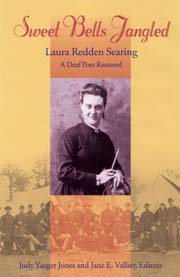Laura Redden Searing
A Deaf Poet Restored
Judy Yaeger Jones and
Jane E. Vallier, Editors
|
View the table of contents. Read an excerpt. Read reviews: The Women’s Review of Books, The Forum, Whistling Shade, Disability Studies Quarterly. |
$34.50s print edition $34.50 e-book |
Gallaudet Classics in Deaf Studies, Volume 4
From The Forum, The Journal of the Minnesota Independent Scholars’ Forum
Judy Yaeger Jones, a member of MISF, stumbled onto the story of Laura Redden Searing while she was a project director for Minnesota Women’s History Month. It turns out that Glyndon, Minnesota (in the Red River valley) was named for Howard Glyndon—the pen name of Laura Redden Searing. (Glyndon is, in fact, the only town in the United States named for a woman writer during her lifetime.) Jones’s research eventually became this book: she recounts the details of Redden’s life in an introductory essay, “A Brief Biography of Laura Redden Searing.”
Laura Catherine Redden was born in 1839. At the age of 13, she contracted what was probably meningitis and lost her hearing. She completed her education at the Missouri School for the Deaf and became an accomplished journalist, writing under the pen name of Howard Glyndon for the St. Louis Republican. As the official Civil War correspondent for the St. Louis Republican, Redden traveled to Washington, D.C., in 1861. From there she covered political and military news. In 1864, she published her first poetry collection: Idyls of Battle and Poems of the Rebellion. She made enough money from this collection to travel to Europe, where she met the Irish artist Michael George Brennan. Redden, who was 30, independent, and not planning to marry, nevertheless made plans to marry Brennan. For an assortment of reasons, she came back to the United States; before she could return to Europe Brennan had died of tuberculosis. An epic poem, Sweet Bells Jangled, writes of this love and Laura’s life; it was included in her second volume of poetry, Sounds from Secret Chambers (1874).
In later years, Redden married Edwin Searing and had a daughter by him. The marriage did not last; Laura and her daughter moved to California, where Laura continued to write poetry. She died in 1923.
Jones’s biographical essay is complemented in an essay by Jane Vallier, an assistant professor in English at Iowa State University. This essay is titled “Laura Redden Searing: A Restored Voice in American Poetry.” Vallier takes on the task of placing Redden in the context of nineteenth century poetry. She draws parallels between the life of Redden and the life of the better and the life of the better known Emily Dickinson: early writing, singular life, religious doubts, and isolation. Vallier explains that without a family name or a formal education, Redden had to wait for her peers to recognize her as a poet. Her pilgrimage to Europe was an important part of her education, and the experience of falling in love with Michael Brennan was the catalyst for her poetic fire. Vallier describes Redden as “a magician with symbols, rhythms, rhymes, [whose] work resonate[s] with the human heart.” (25)
The book concludes with 70 poems by Laura Redden Searing. I found that Redden Searing has a remarkable range of styles and voices. Her Civil War poetry gives one a renewed sense of the anguish and uncertainty the Civil War created for American families. Some of the autobiographical poems, especially “My Story,” are an insight into the terror of sudden deafness.
I was particularly amused by “A Girl’s Subterfuges” (Part I of Sweet Bells Jangled) in which Laura creates a dialogue between young women, such as herself, who do not wish to marry and older women who see marriage as the only safe refuge for all women.
“Wilt thou be an ancient maiden?”
Say the matrons unto me;
“Wilt thou have no cubby children,
Clinging fondly to thy knee?”
“Ruddy matrons! happy mothers!
What are children unto me?”
“Will thou live alone forever?”
Say the matrons unto me.
Light I answer: “Who is single
Should be ever blithe and free.
Sober matrons! thoughtful mothers!
Liberty is sweet to me!”
....
And I answer, lightly laughing,
What the matrons say to me:
“I am given to Diana,—
To the huntress, fair and free,—
And the lumpy, lovesick Venus
Hath no follower in me!”
Sweet Bells Jangled is a must-read for those concerned with the history of ASL and Deaf education. I would also recommend this book to anyone interested in Civil War studies or in Women’s studies.
Judy Yaeger Jones is an independent scholar and educational consultant in multicultural, disability, and women’s history in St. Paul, MN.
Jane E. Vallier is an adjunct assistant professor in the Department of English at Iowa State University.
Print Edition: ISBN 978-1-56368-138-7, 6 x 9 paperback, 224 pages
$34.50s
E-book: ISBN 978-1-56368-268-1
$34.50
To order by mail, print our Order Form or call:TEL 1-800-621-2736; (773) 568-1550 8 am - 5 pm CST
TTY 1-888-630-9347
FAX 1-800-621-8476; (773) 660-2235

